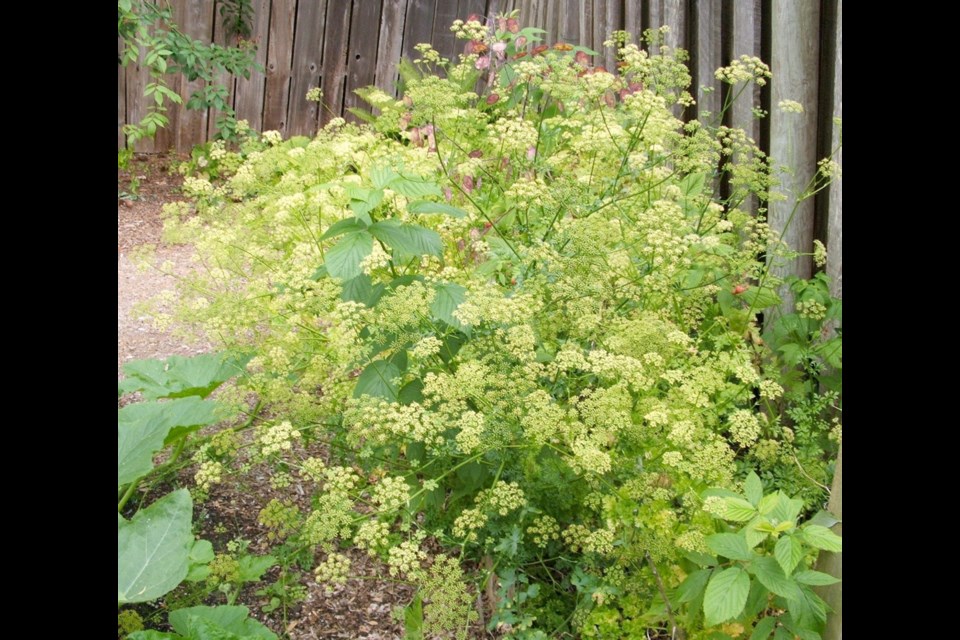Dear Helen: Last summer, I had what looked like miniscule wasps in my greenhouse. At first, I whisked them gently outside — until I observed one grasping a whitefly. After that, I let them stay, and watched them hovering around the tomato and cucumber plants. They did not sting or show any aggression, and I had no whitefly problem. Do you know what they were? Most vanished in the fall as I removed old plants, though I did find some in the folds of winter lettuces in the greenhouse.
B.C.
Your helpful insects were probably tiny parasitic wasps (Encarsia formosa) that lay eggs in immature whiteflies. The eggs hatch into larvae that feed within the developing whiteflies and then emerge as adult wasps. They are sometimes referred to as “whitefly destroyer.”
These beneficial parasites are attracted by the odour of the honeydew excreted by whiteflies. The little wasps are nurtured by flowers rich in nectar, a food source that gives them energy to lay eggs. They are most active, and effective, in warm, bright conditions.
Flowers that attract and feed these insects include sweet alyssum, cilantro, dill, parsley, thyme, mint, rosemary and yarrow.
Dear Helen: You have often mentioned your use of seaweed fertilizer in indoor seeding and also in your outdoor transplanting solution. It sounds as though you do a lot of both. Is that not very expensive?
C.S.
I buy the odd bottle of condensed seaweed fertilizer solution, but I most often use the powdered form. It’s less costly and more environmentally sensible.
Reindeer’s Natural Plant Foods, based in Lake Cowichan, is one source. On the website (reindeersnatural.ca), click on Links for a list of retailers that carry Reindeer products. They also offer an email service.
Alternate sources for packets of dried seaweed extract are T&T Seeds and Stokes Seeds.
Dear Helen: What vegetable plots do you protect from insect pests with row covers? When and how do you arrange it over a planting?
V.P.
These lightweight barriers that “float” on the tops of plantings protect carrots from egg laying by the carrot rust fly. They prevent leaf miners from damaging spinach, beets and chard, cabbage butterflies and root maggots from ruining cabbage family plants, and other root maggots from turning developing onion bulbs into mush.
I put the covers on as soon as a plot is seeded or transplanted. I plant in 120-cm wide “blocks” of closely spaced plants and secure the cover around the blocks by tucking the edges into the soil or placing boards over the edges. I make sure to buy a cover that is wide enough to leave sufficient slack to accommodate the growing plants. West Coast Seed’s lightweight row cover is a perfect (2.2-metre) width for my plots.
GARDEN EVENTS
View Royal meeting. The View Royal Garden Club will meet this evening (Wednesday, Feb. 26) at 7:30 in Wheeley Hall, behind Esquimalt United Church, 500 Admirals Rd. Entrance is off Lyall St. Paige Erickson-McGee of the Habitat Acquisition Trust will speak about “Conquering Invasive Plants in Your Garden.” The evening will also include a sales table with plants and garden items and a mini show of exhibits from members' gardens. Non-member drop-in fee $5. viewroyalgardenclub.wordpress.com.
Seedy in Sooke. Sooke Food CHI (Community Health Initiative) will present Sooke's 11th annual Seedy Saturday on Feb. 29, 10 a.m. to 3 p.m. in the Sooke Community Hall, 2037 Shields Rd., opposite the Legion. This family-friendly seed and local food growing event will showcase a range of seed and plant vendors, a seed exchange table, educational displays and a Kids Zone.
Orchid Show. The Victoria Orchid Society will host their annual Show and Sale on Saturday, Feb. 29, 9 a.m. to 5 p.m. and Sunday, March 1, 11:30 a.m. to 4 p.m. in Our Lady of Fatima Hall, 4635 Elk Lake Dr. The show's theme, “Conserving Nature's Beauty,” will emphasize the importance of Calypso Woods, a Calypso orchid habitat near Sooke. Part of the proceeds from the show will go toward the preservation of the habitat. Admission $7 adult, $6 students and seniors.
Trees at Kew. The Victoria Horticultural Society and Victoria Hardy Plant Group will present the 2020 Elizabeth England Memorial Lecture on Sunday, March 1, at 3 p.m. in the Salvation Army Victoria Citadel, 4030 Douglas St. Access is off McKenzie Ave. Tony Kirkham, head of the Arboretum at the Royal Botanic Gardens at Kew, London, U.K., will present “250 Years of Trees at Kew.” Admission is $10 cash at the door, free to VHS members. Doors open at 2:30.



